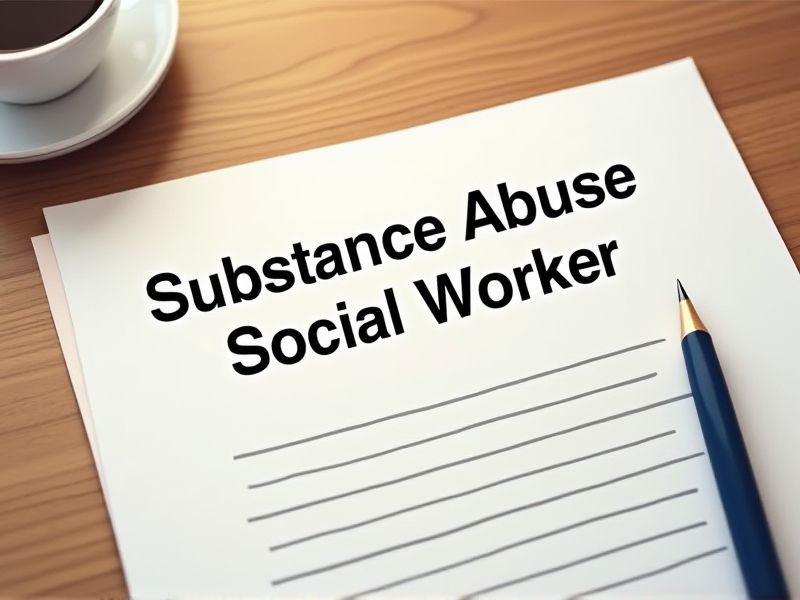
Substance abuse social workers deal with complex cases requiring specialized knowledge and skills to effectively support clients. Certification ensures that social workers have met rigorous standards, providing a measure of trust and reliability in their capability to handle such sensitive situations. Without specific credentials, handling the nuances of substance abuse treatment might compromise the quality of care provided. Here are some important certifications you may need as a Substance Abuse Social Worker.
Certified Addictions Counselor (CAC)
The expertise of a Certified Addictions Counselor (CAC) enhances the effectiveness of substance abuse social workers by providing specialized knowledge in addiction treatment. CACs employ evidence-based practices, which lead to improved recovery outcomes for individuals struggling with substance abuse. Their certification ensures adherence to industry standards, promoting ethical and effective interventions. The collaboration with CACs aids social workers in addressing the complex needs of clients, leading to more comprehensive care.
Certified Alcohol and Drug Counselor (CADC)
The need for a Certified Alcohol and Drug Counselor (CADC) in the role of a Substance Abuse Social Worker arises from the necessity for specialized knowledge in addiction treatment methodologies. High relapse rates indicate that without such expertise, clients may not receive the tailored interventions they require for recovery. CADC credentials provide social workers with skills essential for addressing complex emotional and psychological issues underlying substance abuse. Studies have shown that structured programs led by certified professionals tend to yield better outcomes in rehabilitation settings.
Certified Substance Abuse Counselor (CSAC)
The involvement of a Certified Substance Abuse Counselor (CSAC) equips substance abuse social workers with specialized skills to assess and address complex addiction-related issues. CSACs provide evidence-based interventions that enhance the effectiveness of treatment plans for clients struggling with substance abuse. Collaboration with a certified counselor allows for a more comprehensive approach, integrating clinical expertise and social support. Social workers benefit from the CSAC's ongoing training in current treatment methods, ensuring that care remains aligned with industry standards.
Licensed Clinical Social Worker (LCSW)
Licensed Clinical Social Workers (LCSWs) possess the advanced training and credentialing necessary to offer comprehensive assessments, crucial for identifying the underlying psychological factors contributing to substance abuse. Their expertise enables effective treatment planning, which incorporates both therapeutic and psychosocial interventions tailored to individual recovery needs. LCSWs can also facilitate group therapy sessions, providing a supportive environment that encourages peer interaction and shared learning among those battling substance abuse. They are adept at navigating complex systems, which helps in coordinating care and accessing resources critical for long-term recovery support.
Board Certified Addictions Specialist (BCAS)
A Board Certified Addictions Specialist (BCAS) brings advanced expertise in addiction disorders, enhancing the effectiveness of interventions by substance abuse social workers. Their specialized training in addiction science and treatment techniques translates to more informed and effective care plans. With a BCAS certification, transparency in updated best practices and ethical guidelines ensures that social workers operate within the most current frameworks. Employers and clients gain greater confidence in the social worker's ability to manage complex substance abuse cases, improving overall treatment outcomes.
National Certified Counselor (NCC)
The National Certified Counselor (NCC) credential is essential for substance abuse social workers because it demonstrates a standardized level of knowledge and competency in counseling practices. Substance abuse scenarios often involve complex psychological issues; having an NCC ensures the counselor is well-equipped with evidence-based strategies. This certification enhances credibility with clients and employers, leading to higher trust and better therapeutic outcomes. The NCC also requires ongoing education, ensuring that professionals stay updated on the latest research and treatment modalities in substance abuse counseling.
Certified Clinical Alcohol Counselor (CCAC)
The Certified Clinical Alcohol Counselor (CCAC) designation establishes a standardized level of competence that aids substance abuse social workers in effectively addressing alcohol-related issues. This certification provides social workers with specialized knowledge and techniques tailored to support individuals suffering from alcohol addiction. Clients receive more comprehensive care due to the counselor's expertise in alcohol-related interventions, preventing potential relapse. The CCAC credential enhances the credibility and trust of social workers, fostering better therapeutic relationships with clients struggling with alcohol dependence.
Certified Recovery Specialist (CRS)
A Certified Recovery Specialist (CRS) provides essential peer support that enhances the therapeutic relationship between substance abuse social workers and their clients. Their personal experience with recovery allows them to build trust and rapport, which can lead to increased client engagement in treatment. The CRS's role in offering encouragement and sharing coping strategies can effectively complement the social worker's clinical interventions. Their presence can contribute to lower relapse rates and improved treatment outcomes by providing a model of successful recovery.
Certified Mental Health Professional (CMHP)
Substance abuse social workers frequently encounter clients with complex mental health challenges due to the intertwined nature of addiction and mental disorders. A Certified Mental Health Professional provides specialized expertise to accurately assess and address these mental health needs alongside addiction treatment. By incorporating CMHPs into their practice, social workers enhance their capability to deliver holistic and effective interventions for dual diagnoses. This collaboration can lead to improved client outcomes and reduce relapse rates by addressing underlying mental health issues.
Certified Peer Recovery Specialist (CPRS)
Substance abuse social workers frequently encounter clients who benefit from real-world experiences and understanding; CPRSs, having often overcome similar challenges, provide authentic empathy and perspective. CPRSs can effectively bridge the gap between clinical strategies and personal experiences, enhancing the therapeutic alliance and supporting recovery. They offer insights and shared experiences that can motivate clients, leading to improved engagement and outcomes. Recruiting CPRSs can reduce stigma and foster a sense of community, which facilitates a supportive recovery environment.
Summary
By obtaining certifications, you can enhance your expertise and credibility in the field of substance abuse social work. This specialized knowledge often results in more effective client interventions and improved recovery outcomes. Employers may also recognize your certified skills and offer increased career opportunities or advancement. Certifications can lead to strengthened networks within the professional community, facilitating the exchange of best practices and support.
